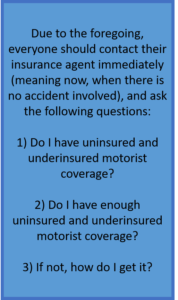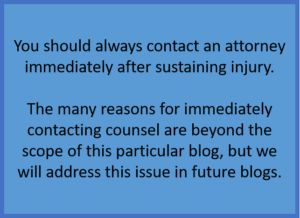
If you sustain personal injury or someone you love dies due to the wrongful act of another person or company, you want and need to consult an attorney. When you do, be prepared for questions – the attorney’s questions and your questions.
If you think “personal injury” is a broad term, you’re right. There is no limit to the number of ways injuries occur. And, given that all injuries happen somehow, there are limitless accidental, negligent, reckless, and/or intentional causes of injuries. Accordingly, if you start your first attorney meeting with the question – “Do I have a claim for my injury?” – a personal injury attorney’s initial answer should not be “yes” or “no”. Instead of a yes or no answer, expect questions.
The Personal Injury Attorney’s Questions
The attorney’s questions will focus on three (3) critical components of a personal injury claim.
- Was your injury caused by the negligence, recklessness, and/or intentional act of a person and/or company? This is the “liability” question. In short, is someone else liable for your injury?
- What harms and losses did you sustain? This is the “damage” question. Without both “liability” and “damages”, you do not have a legally cognizable claim, meaning your claim wouldn’t meet the basic criteria for pursuing it through the legal system.
- What are the potential sources of recovery? Basically, is there money somewhere to compensate you for all or part of the damages you sustained? For example, if an uninsured driver hits you and you do not have uninsured motorist coverage with your car insurance carrier, you might not recover anything – even though both liability and damages exist.
Personal injury is personal. So, the answers to the above questions – and all of the detailed questions which determine the answers to those three (3) central questions – depend on your personal situation. What happened to you? Taking each in turn:
- Liability
To begin determining liability, expect the question: What happened? Then expect many follow-up, detailed questions after your initial response. e.g., What time of day? Where were you going? Where were you coming from? What were you doing? What was the weather? Who did you talk to? Did you see the accident coming? Were other vehicles near the scene? Did people talk to you after the accident? Do you remember any identifying marks on the roadway? What businesses were close by? Are there any witnesses? Did the police investigate? Were you on the phone? Was the other driver on the phone? Depending on your personal situation, the questions are limitless. Do not get offended by detailed, personal questions. When dealing with personal injury cases, nothing is more appropriate than the saying, “the devil is in the details!” - Damages
When dealing with any injury claim, there are multiple damage components including, but not limited to, 1) medical expenses incurred, 2) future medical expenses, 3) lost wages incurred, 4) future lost wages (otherwise known as the impairment of your ability to labor and earn), and past, present, and future mental and physical pain and suffering. Your attorney will, therefore, ask questions about your personal situation to determine if you are entitled to recover the damages identified above. i.e. What parts of your body were injured? What are your injuries? Was EMS called to the scene? Did you go to the ER? Have you seen any other medical providers? Where do you work? Did you miss any work? When did/will you go back to work? Do you need surgery? Do you need physical therapy? How has the injury impacted you mentally? Can you still participate in your normal hobbies? Can you do chores around your house? How has your life been different since the injury? Again, personal injury is personal, so the number of questions will depend on your personal situation. - Recovery
Personal injury claims are civil claims. If your injury is serious or if you lost someone you love – there is not enough money in the world to compensate you for your loss. But, money is all the law can give you. So, the attorney must determine what sources of money are available to pay your damages. If a big company caused your injury, the company will likely have money or insurance to cover your damages. If an uninsured driver caused your injury, it is a different story. Expect questions like: Have you been contacted by an insurance company? Was your injury caused by a person and/or a company? Was the at-fault party working at the time of your injury? Were you hit by a commercial vehicle? Who is your car insurance carrier? Do you have underinsured motorist coverage? Do you have uninsured motorist coverage? How many cars are in your household? Who insures the at-fault party (usually noted on the collision report)? Did anyone else cause or contribute to your injury? Did anything else (such as a roadway condition) cause or contribute to your injury?

Do you have a claim?
From your answers to these questions, the attorney will form an answer to the initial question of: Do I have a claim? Assuming the answer is “yes”, the attorney will give you a few details about the process. For example, a lawsuit is not filed just because you have a claim. After you finish receiving medical treatment for your injury and/or your future medical care is relatively certain, the attorney will try to negotiate with the at-fault party’s insurance carrier or with the at-fault party. Usually, the negotiation process begins with the attorney collecting evidence (such as police report, 911 tapes, and photographs) and your medical records, medical bills, and lost wage documentation. After the documents and evidence are collected, the attorney will submit a demand on your behalf. Typically, the “demand” begins the negotiation process. If your claim cannot be settled during negotiations, the attorney will usually recommend filing a lawsuit – but, because personal injury is personal, that is your personal decision. And, the attorney may not always recommend filing a lawsuit – based on your personal situation.
Your Questions to the Personal Injury Attorney
Always remember – it is your personal claim, so you get to ask questions as well. Ask as many questions as you want to ask. The attorney’s answers will help you set your expectations and pick the right lawyer for you.
Here are some standard questions to ask personal injury attorneys:
- What are your fees, and how do you get paid?
- If I do not recover any money, will I owe you anything for claim-related or case expenses?
- Do you handle a lot of cases like my case? How much experience do you have?
- Do you think my claim will settle during negotiations? Do you think a lawsuit is likely? If a lawsuit is filed, do you think I will have to go to trial? Does your firm have trial experience?
And, finally, the two most common questions personal attorneys are asked during potential client meetings:
- How much is my claim worth?
- How long will it take?

If the attorney gives you definite answers to these two questions during your first meeting, pick a different attorney. Unless your injury occurred a year prior to your first attorney meeting, there is no legitimate way to answer these two questions during the first meeting. A good personal injury attorney will, therefore, respond by telling you, “I don’t know.”
Bottom line: The attorney’s questions are personal, and your questions are personal. Choose the right attorney for you, and understand your claim. At DeCamillis & Mattingly, PLLC, we are dedicated to the best interests and welfare of anyone who comes to us for help … whether that means representing you, referring you to another attorney, or any number of other options for advice. When in doubt, call us, and we’ll give you the benefit of our decades of experience in personal injury and wrongful death law.


